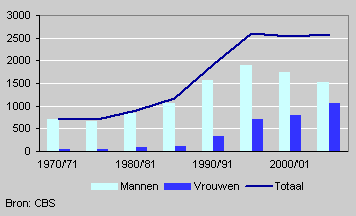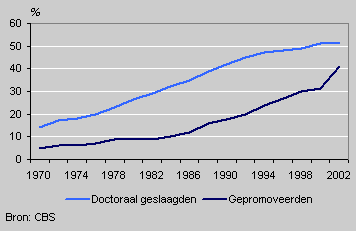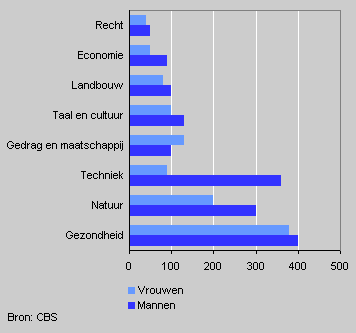More and more doctorates for women

In the study year 2002/’03 some 2,600 people in the Netherlands completed a doctoral thesis and obtained a doctor’s degree. The share of women obtaining a doctorate has risen strongly . In 2002/’03, 41 percent of doctorates were awarded to women, compared with 27 percent in 1994/’95.
Number of doctorates stable
In the study year 2002/’03 nearly 2,600 people received a doctorate from a Dutch university, slightly more than in the previous year. The yearly number of doctorates awarded has been around 2,500 since 1994/’95.
Doctorates, 1970-2003

Strong growth between 1985 and 1995
Seen over a longer period the increase has been substantial. In 1970/’71 just over 700 people received a doctor’s degree. This number grew steadily, until the mid eighties when the growth rate shot up. In the space of ten years the number of people obtaining a doctorate rose to more than 2,600 in 1995/’96. The growth in the number of doctorates follows the increase in the number of university graduates with a delay of a few years.
Increasing share of doctorates for women
In 2002/’03 four out of every ten PhDs were awarded to women. This used to be very different: in the early seventies, only one in twenty doctor’s degrees were awarded to women. This rose to two in ten around 1990 and three in ten in 2000/’01. The percentage of women receiving a PhD thus followed the percentage of female university graduates.
Female graduates and female doctors

Most women in behavioural and social sciences
Relatively most women obtained a doctor’s degree in the discipline behaviour and society (which includes social sciences) in 2002/’03: 57 percent of degrees awarded in this discipline were for women. The share of women was smallest in engineering: only 20 percent of doctor’s degrees in engineering were for women.
Doctor’s degrees by discipline, 2002/’03

One third of doctorates in health-related disciplines
Most doctorates were awarded in the health disciplines (including medicine) in 2002/’03: 30 percent of the total number of doctor’s degrees. Science followed with 20 percent and engineering with 18 percent of all doctorates. Traditionally, the fewest doctorates are awarded in law, while this discipline attracts by far the largest number of students.
Frank Blom and Free Florquin